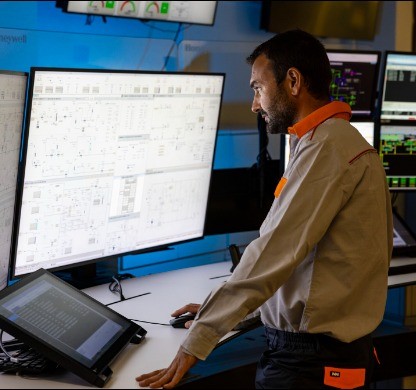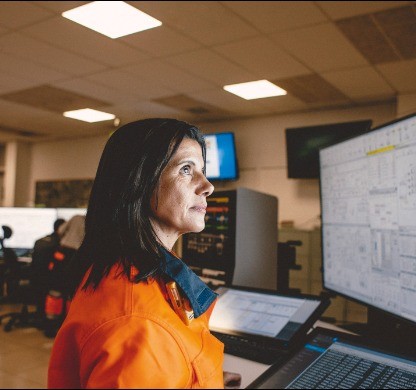
A 'smart copilot' to help you at work

Artificial Intelligence
Generative AI: The next revolution in the world of work
Spanish companies are at the forefront of adopting generative AI, which is capable of generating content to help us in creative work and also to efficiently automate more routine tasks, such as finding information or summarizing documents. Having an adequate training offer is one of the main needs for its implementation to become mainstream in the business world.
Creating texts, analyzing reports, designing presentations, or preparing proposals by simply giving precise instructions to a virtual assistant is the latest leap forward in artificial intelligence (AI), a technology that is already being implemented in companies, allowing its users to save time and improve the quality of their work. "Generative AI is a paradigm shift similar to the revolution that the Internet represented and has the potential to become an inseparable tool that significantly improves our lives. Could we imagine not using the Internet to search for information? Naturally, we are going to turn to AI for various daily tasks," explains Antonio Cruz, director of Modern Workplace at Microsoft Spain.


Based on Large Language Models (LLMs), software systems designed to communicate using natural language, generative AI "is democratizing how we interact with technology because interacting with it is trivial for almost anyone. We can ask it questions by writing as if it were a chat, or by audio, as if you were calling someone, and get answers that make sense because they are based on a statistical calculation made from a huge amount of information," explains Guillermo Lorbada, AI expert and Head of New Ways of Working at Repsol.
Major Spanish companies are already applying generative AI
The world of work is the first area where its impact is being seen: according to the latest Microsoft Work Trends Index, three out of four people around the world are already using AI at work.
"In Spain," explains Antonio Cruz, "we are at the forefront of the adoption of generative AI. A study carried out by LinkedIn places us as the fourth European country and the ninth in the world in its adoption. Among our clients are organizations from all sectors: banking, insurance, technology companies, or public institutions."
The consulting firm IDC, which specializes in the information technology market, estimates that 62% of major Spanish companies currently use AI, and 25% plan to implement it in the next 24 months.
In a global market increasingly oriented towards automation and innovation, companies that do not adopt this technology run the risk of losing competitiveness, says Cruz, "because current AI projects show a direct impact on productivity and a Return on Investment (ROI) of more than 280%."
75% of workers worldwide already use AI in their work routine, according to the 2024 Microsoft Work Trends Index
Having an adequate training offer is one of the needs for its implementation to become mainstream in the business field. "The main challenge for users is not so much a technological issue, of use, but of habits, of rethinking how things are done. At first we think of traditional tools with normative behavior: if I press this button, this happens. With AI, the quality of the response depends on the quality of the question and the information available, but, above all, on the interactions between the user and the tool: it is not about giving instructions, but about conversing until the optimal response is determined," explains the director of the multinational technology company.
In addition to knowing how to ask the right questions, AI users must be aware that they need to review all the content proposed by the assistant. This is a basic guideline in the training that Repsol provides to its employees before starting to use generative AI. As Guillermo Lorbada explains, "in the training we emphasize that we, the users themselves, are responsible for that content. We could never use the excuse that it was the machine that did something. Generative AI, like a co-pilot, helps us, who are the pilots."
For this expert, the use of this technology in any area of society must respond to "ethical and responsible principles that ensure that AI is based on reliable information and transparent criteria that avoid bias in the solutions it proposes." For this reason, Repsol's training proposal "emphasis is placed on the responsible use of AI to avoid all types of risks. It is something that we must address not only from a perspective of respect for the law, but also as a company commitment," he stresses.